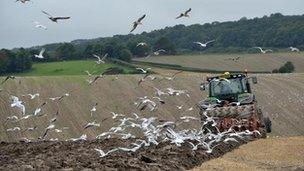Farm wages will suffer if board scrapped, warns AM
- Published

AMs will debate the future of the board that sets farm wages
More than 13,000 farm workers in Wales will be affected by the abolition of an agency that sets their wages, a Labour assembly member warns.
Mick Antoniw says scrapping the Agricultural Wages Board (AWB) will increase rural poverty.
The UK government said workers would still be protected by the national minimum wage.
A decision on the board's future is due soon from the UK Department for Environment, Food and Rural Affairs.
Established after World War II, the board is an independent body that sets the wages of agricultural workers in England and Wales.
The Westminster coalition announced its intention to scrap the board in July 2010.
But in a report, Pontypridd AM Mr Antoniw said the move would jeopardise the pay and conditions of thousands of Welsh workers.
He will set out his case for retaining the board in a short debate in the assembly on Wednesday.
'Poverty'
Mr Antoniw said: "If the AWB is not retained in Wales there is every concern that thousands of workers will be forced into poverty in rural areas as wages would be slashed as the statutory floor of protection will have been removed.
"The abolition of the AWB would hit many agricultural workers who work alone or in small teams in isolated areas, who will not be able to negotiate for themselves."
A spokesman for the Department for Environment, Food and Rural Affairs (Defra) said it hoped to make announcement on the board's future soon.
He said: "Agricultural wages laws are more than 60 years out of date, difficult to understand and entirely out of step with modern work practices.
"Changing them would free numerous small farmers from unnecessary burdens while keeping farm workers, like all other workers across the economy, well protected by national minimum wage legislation."
'Outdated'
Writing on Twitter, deputy agriculture minister Alun Davies said the Welsh government was "determined to maintain these structures".
Scotland already has its own board while farming unions are divided on the issue.
The Farmers' Union of Wales wants to keep the board, while NFU Cymru says it has become redundant.
Conservative AM Antoinette Sandbach, shadow rural affairs minister, said the "quango" was "outdated and complicated".
"Scrapping it will put farmers on an equal footing with other Welsh employers," she added.
- Published14 May 2012
- Published27 September 2011